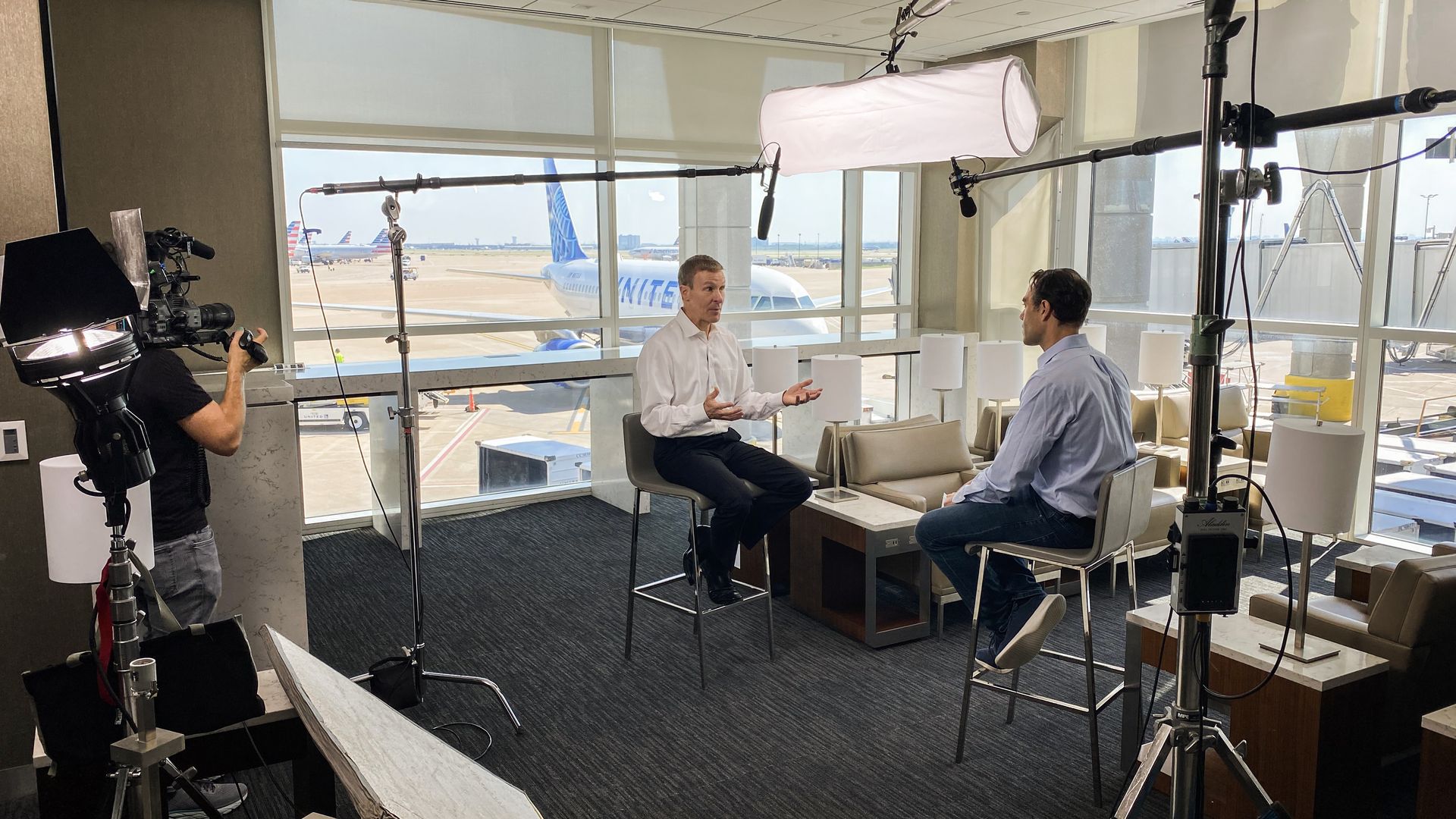| |
| |
| |
| Presented By Google |
| |
| Axios AM |
| By Mike Allen ·Jun 21, 2021 |
| 🕶️ Good morning, and welcome to summer! Smart Brevity™ count: 1,478 words ... 5½ minutes. Edited by Zachary Basu. |
| |
| |
| 1 big thing — Scoop: Trump works refs ahead of book barrage |
 |
|
| Graphic: Axios Visuals |
| |
| Former President Trump has given at least 22 interviews for 17 different books since leaving office, with authors lining up at Mar-a-Lago as he labors to shape a coming tsunami of Trump tomes, Axios has learned. - Why it matters: Trump advisers see the coming book glut as proof that interest in "POTUS 45," as they call him, has never been higher. These advisers know that most of the books will paint a mixed picture, at best. But Trump is working the refs with charm, spin and dish.
Offering Diet Cokes and dressed in suit and tie, Trump spent an average of about 90 minutes with each of the authors, some of whom were invited to stay and eat dinner at Mar-a-Lago (although not with him). - The interviews are mostly on the record, for use when the books publish. So Trump, who has rarely been heard on non-Fox outlets since leaving office, will see himself quoted constantly over the next year.
Between the lines: Sources tell me Trump makes each author feel they're getting something special. And some of them are: Many of the nuggets will definitely make news. But there appears to be quite a bit of overlap in the "scoops" Trump is dishing out. - There's intense jockeying among the authors over several publishing-date logjams in the coming 18 months, with Michael Wolff's "Landslide" currently in pole position (July 27). The book many Trump insiders are awaiting most is Maggie Haberman's, due next year.
Jonathan Karl of ABC News — whose first Trump book, "Front Row at the Trump Show," was a New York Times bestseller in both hardcover and paperback — spent five hours at Mar-a-Lago, including about 90 minutes on the record with Trump. - Karl, who has also interviewed numerous Trump Cabinet members, told me: "If you thought there was no more to know, it's been mind-blowing."
More interviews are likely (including one with Jennifer Jacobs of Bloomberg), and several authors who've had one interview may get a second dip. Trump personally made all these decisions on who to see. - Five authors have gotten two interviews: Michael Wolff ... Maggie Haberman ... former Trump counselor Kellyanne Conway ... Wall Street Journal's Michael Bender, whose book is scheduled for Aug. 10 ... and The Federalist's Mollie Hemingway, whose "Rigged" is due Sept. 21.
- Trump has given one interview each to about a dozen other book projects (several with joint authors): WashPost's Phil Rucker and Carol Leonnig ... Susan Glasser and Peter Baker ... Jon Karl ... Jonathan Martin and Alex Burns ... Ryan Lizza and Olivia Nuzzi ... Washington Examiner's David Drucker ... N.Y. Post's Miranda Devine — whose "Laptop from Hell," about Hunter Biden — is coming Sept. 7 ... N.Y. Times' Jeremy Peters ... Ari Fleischer — whose "Broken," about the press in the Trump era and beyond — will be out in 2022 ... Variety's Ramin Setoodeh, writing about "The Apprentice" ... and The Federalist's Ben Weingarten, writing on U.S.-China policy.
- Trump said "no" to the book by Bob Woodward and Robert Costa.
The bottom line: No slowdown in sight for Trump headlines. |
    |
| |
| |
| 2. Tucker shuns 2024 |
 |
|
| Screenshot: Fox News |
| |
| Tucker Carlson — the top-rated host in cable news, who's rumored as a possible GOP presidential candidate in 2024 — told the "Ruthless" podcast he has no plans to run. - "Oh, God, come on!" Carlson told the hosts. "That seems like a fun job!" [Laughter] "No! No!"
Carlson said he has known and talked to every president for about 30 years: "I can't think of any one whose life was improved ... I guess if I was the last person on earth who could do it. But that seems pretty unlikely that I would be that guy — you know what I mean? ... I'm a talk show host; I enjoy it." 🍿 Ben Smith, in a fascinating column for the N.Y. Times (subscription), reports that while condemning journalists on the air, Carlson has been a source for many reporters on Trumpworld and Fox internal politics: I won't talk here about any off-the-record conversations I may have had with him. But 16 other journalists (none from The Times; it would put my colleagues in a weird position if I asked them) told me on background that he has been, as three of them put it, "a great source." |
    |
| |
| |
| 3. Tech's war for your wrist |
 |
|
| Illustration: Sarah Grillo/Axios |
| |
| Tech's biggest companies are ramping up competition for the real estate between your hand and your elbow, Axios' Scott Rosenberg writes. - Why it matters: Hardware transitions only come every decade or two. In the past, they've given upstart contenders an opportunity to knock off the Goliaths who dominated the current generation.
The next big hardware platform after the smartphone will likely involve devices for your eyes, your ears and your wrists. - One big challenge for designers of this wearable computer of the future is where to put the central processor and the battery needed to power it. Your forearm looks like the best candidate, right now.
Keep reading. |
    |
| |
| |
| A message from Google |
| Google is expanding its support for Black founders |
| |
 |
| |
| Black startup founders are consistently locked out of access to the funding that is critical to their success. That's why Google created a second round of the Google for Startups Black Founders Fund. Founders that received funding in round one went on to raise over $38M post-award. Learn more. |
| |
| |
| 4. Pic du jour: New York's first big concert |
| Photo: Kevin Mazur/Getty Images The Foo Fighters reopen Madison Square Garden yesterday. - The concert, with all attendees vaccinated, was the Garden's first full-capacity event since March 2020.
|
    |
| |
| |
| 5. 🎰 The psychology of vaccine lotteries |
 |
|
| Illustration: Aïda Amer/Axios |
| |
| NBA season tickets. Scholarships. A chance at $5 million. The list of lotteries and raffles to drive up COVID-19 vaccination rates is growing, and some local officials are already reporting "encouraging" results, Axios' Ivana Saric writes. - Nathan Novemsky, a professor of marketing and psychology at Yale University, says that people have a hard time conceiving the odds of winning lotteries — and many tend to overweight the "incredibly low" chances.
Ohio, the first state to announce a "Vax-a-Million" campaign, saw a 94% increase in vaccinations among 16- to 17-year-olds in the week after the initiative launched — the biggest surge for any age group. |
    |
| |
| |
| 6. "Axios on HBO": HUD secretary on Black homeownership decline |
 |
|
| Photo: "Axios on HBO" |
| |
| Poor enforcement of the Fair Housing Act is to blame for the decline in Black homeownership rates, Housing and Urban Development Secretary Marcia Fudge told me in an interview for "Axios on HBO." - "That is why we are doing things like homeownership assistance, why we're addressing the student loan issue, why we're looking at how credit is distributed," Fudge said during a visit to her native Cleveland.
- "For people of color, especially Black people, homeownership is wealth. It is not only wealth to us, but it is generational wealth."
Watch a clip. |
    |
| |
| |
| 7. United CEO sounds alarm on pilot shortage |
 |
|
| Photo: "Axios on HBO" |
| |
| United Airlines CEO Scott Kirby told Dan Primack on "Axios on HBO" that America could be headed toward a pilot shortage, because "the military produces far fewer pilots today than they did in the Vietnam and Cold War era." - Why it matters: With leisure air travel exceeding pre-pandemic levels, the U.S. travel industry must protect itself from future disruptions as it comes roaring back to life.
Watch a clip. |
    |
| |
| |
| 8. "The Man Who Controls the Senate" |
 |
|
| Senate Energy Committee Chairman Joe Manchin arrives at a hearing last week. Photo: Drew Angerer/Getty Images |
| |
| In The New Yorker, the great Evan Osnos profiles Sen. Joe Manchin (D-W.Va.), whose "sudden clout, after an unremarkable decade in national politics, has made him the subject of almost ludicrous attention": In Manchin's laments about radical politics and the pace of change, one could hear the protests of a man standing athwart history, not quite yelling "Stop," but certainly yelling "Whoa." If Republicans regain the majority in 2022, his moment of prominence will be over as abruptly as it arrived. What he does until then will determine if the Democratic Party, to which he devoted his career, remembers him as a hero who advanced its goals or as the man who obstructed them. For all of Manchin's hesitations, politics is changing fast, even in the terrain he calls home. Keep reading. |
    |
| |
| |
| 9. U.S. oil's cautious return from COVID-19 |
 Data: Baker Hughes; Chart: Axios Visuals There are fresh signs that U.S. oilfield activity is increasing alongside the return of demand and higher prices, but don't look for a return of record pre-pandemic production soon — or maybe ever, Ben Geman writes in Axios Generate. - The number of active U.S. oil rigs rose again last week, the latest increase since COVID-19 significantly lowered oil consumption and prices cratered last year.
|
    |
| |
| |
| 10. An athletes' village like no other |
| Photo: Akio Kon/Pool via AP These recyclable cardboard beds, in an idiosyncratic Olympic Village, will greet athletes at the pandemic-delayed Tokyo summer games when they open on July 23, AP reports. - The village consists of 21 residential towers varying from 14 to 18 floors with a total of 3,600 rooms. They're equipped with 18,000 beds.
The "Fever Clinic" is a prefab complex of isolation rooms where PCR tests will be given to athletes or staff suspected of carrying COVID. - It's a spot nobody will want to visit — unlike a "casual dining area" that will serve famous Japanese dishes from okonomiyaki (a savory pancake) to rice balls to teppanyaki (dishes cooked on an iron grill).
|
    |
| |
| |
| A message from Google |
| Round two: Google for Startups Accelerator for Black Founders |
| |
 |
| |
| In this 10-week virtual program for Black-led startups from across North America, founders are paired with Google experts to identify and solve their most pressing technical challenges. They also participate in workshops focused on fundraising, hiring, and sales. Learn more about how to apply. |
| |
| 📬 Thanks for reading! Please invite your friends, family, colleagues to sign up here for Axios AM and Axios PM. |
 | | The tool and templates you need for more engaging team updates. | | |














No comments:
Post a Comment